A Dual Approach
For
Federated Optimization
Zhenan Fan
Department of Computer Science
Collaborators:
Huang Fang, Michael Friedlander

Federated Optimization
\mathop{min}\limits_{w \in \mathbb{R}^d}\enspace F(\red{w}) \coloneqq \sum\limits_{i=1}^\blue{N} f_i(w)
\enspace\text{with}\enspace
f_i(w) \coloneqq \frac{1}{|\mathcal{D}_i|} \sum\limits_{(x, y) \in \green{\mathcal{D}_i} } \purple{\ell}(w; x, y)
model
number of clients
local dataset
loss function
Primal problem
Dual problem
\mathop{min}\limits_{y_1, \dots, y_N \in \mathbb{R}^d}\enspace G(\mathbf{y}) \coloneqq \sum\limits_{i=1}^N \red{f_i^*}(y_i)
\enspace\text{subject to}\enspace
\sum_{i=1}^N \blue{y_i} = \mathbf{0}
conjugate function
local dual model

Primal-based Algorithm
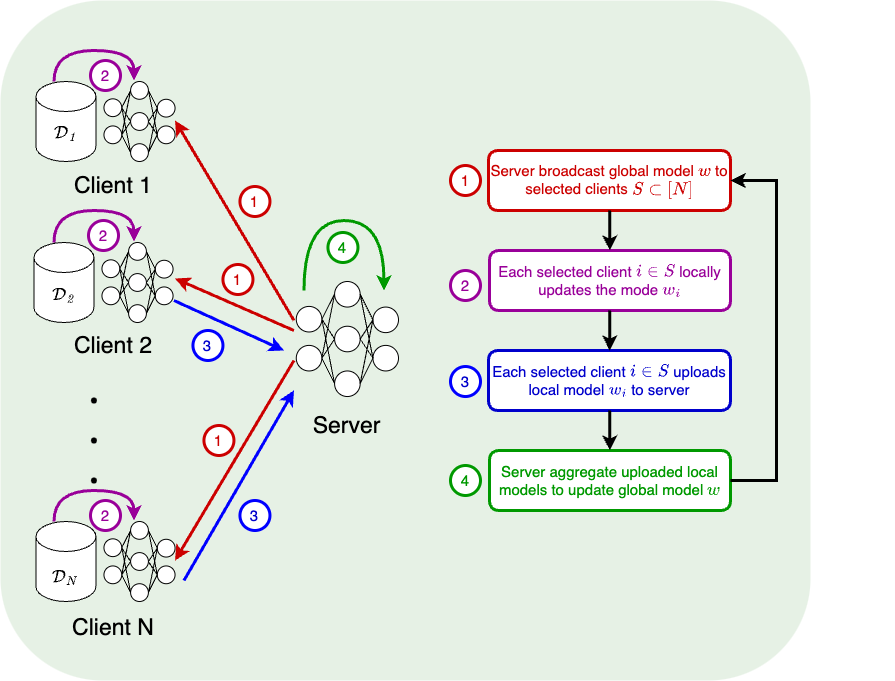
FedAvg [McMahan et al.'17]
w_i \leftarrow w_i - \eta \tilde \nabla f_i(w_i) \quad (K \text{ times})
w \leftarrow \frac{1}{|S|}\sum_{i \in S} w_i
SCAFFOLD [Karimireddy et al.'20]
w_i \leftarrow w_i - \eta (\tilde \nabla f_i(w_i) - c_i + c) \quad (K \text{ times})
c_i \leftarrow \tilde \nabla f_i(w), \enspace
c \leftarrow \frac{1}{|S|}\sum_{i \in S} c_i, \enspace
w \leftarrow \frac{1}{|S|}\sum_{i \in S} w_i

FedDCD
A extension of [Necoara et al.'17]
w_i = \nabla f_i^*(y_i) \coloneqq \mathop{argmin}\limits_{w\in \mathbb{R}^d} \{ f_i(w) - \langle w, y_i \rangle \}
\{\hat w_i\}_{i \in S} = \mathop{Proj}_{\mathcal{C}}(\{w_i\}_{i \in S})
\enspace\text{where}\enspace \mathcal{C} = \{ \{v_i \in \mathbb{R}^d\}_{i \in S} \mid \sum_{i \in S} v_i = \mathbf{0}\}
y_i \leftarrow y_i - \eta \hat w_i
Each selected client computes dual gradient and upload to server
Server adjusts the gradients (to keep feasibility) and broadcasts to selected clients
Each selected client locally updates the dual model

Convergence Rate
Strong convexity
f_i(x) \geq f_i(y) + \langle \nabla f_i(y), x-y \rangle + \frac{\alpha}{2}\|x-y\|^2 \quad \forall i, x, y
Smoothness
f_i(x) \leq f_i(y) + \langle \nabla f_i(y), x-y \rangle + \frac{\beta}{2}\|x-y\|^2 \quad \forall i,x,y
Data heterogeneity
\|\nabla f_i(w^*)\| \leq \zeta \quad \forall i
Theorem
\mathbb{E}[ G(y^T) - G(y^*) ] \leq (1 - \frac{\tau - 1}{N - 1}\frac{\alpha}{\beta})^T (G(y^0) - G(y^*))
[Necoara et al.'17]
and
\mathbb{E}[ \|w^T - w^*\|^2 ] \leq \frac{1}{\alpha^2}(1 - \frac{\tau - 1}{N - 1}\frac{\alpha}{\beta})^T \zeta^2
[Fan et al.'22]

Inexact FedDCE
w_i^t \red{\approx} \nabla f_i^*(y_i^t) \coloneqq \mathop{argmin}\limits_{w\in \mathbb{R}^d} \{ f_i(w) - \langle w, y_i^t \rangle \}
Each selected client approximately computes dual gradient and upload to server
\red{ \mathbb{E}[ \|w_i^t - \nabla f_i(y_i^t)\| ] \leq \delta \|w_i^{t-1} - \nabla f_i(y_i^t)\| }
Theorem
\mathbb{E}[ G(y^T) - G(y^*) ] \leq (1 - \kappa)^T (G(y^0) - G(y^*))
and
\mathbb{E}[ \|w^T - w^*\|^2 ] \leq \frac{20}{3\alpha^2}(1 - \kappa)^T \zeta^2
[Fan et al.'22]
\kappa = \frac{\alpha(\tau - 1)}{32\beta(N-1)}, \quad \delta = \frac{1-\kappa}{4}
with

Accelerated FedDCD
Random coordinate descent with Nesterov's acceleration has been widely studied [Nestrov'12; Lee & Sidford'13; Allen Zhu et al.'16; Lu et al.'18]
Only applied for unconstrained problem. We extend [Lu et al.'18] to linear constrained problem.
Theorem
\mathbb{E}[ G(y^T) - G(y^*) ] \leq (1 - \kappa)^T (G(y^0) - G(y^*))
and
\mathbb{E}[ \|w^T - w^*\|^2 ] \leq \frac{1}{\alpha^2}(1 - \kappa)^T \zeta^2
[Fan et al.'22]
\kappa = \frac{\sqrt{\alpha / \beta}}{(N-1)/(\tau - 1) + \sqrt{\alpha / \beta}}
with

Comparasion
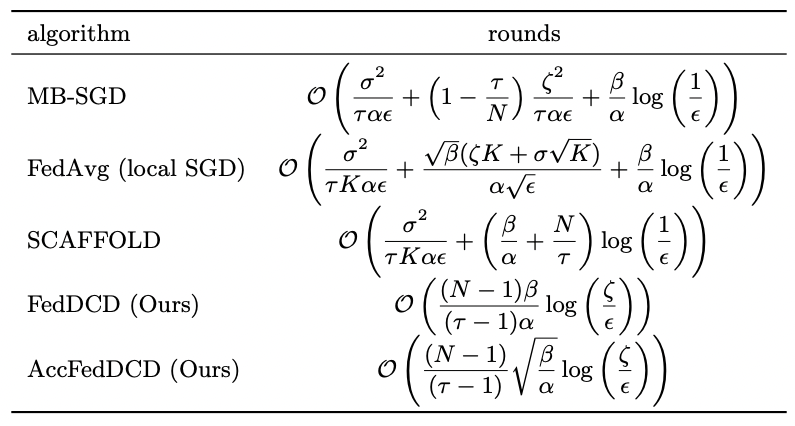
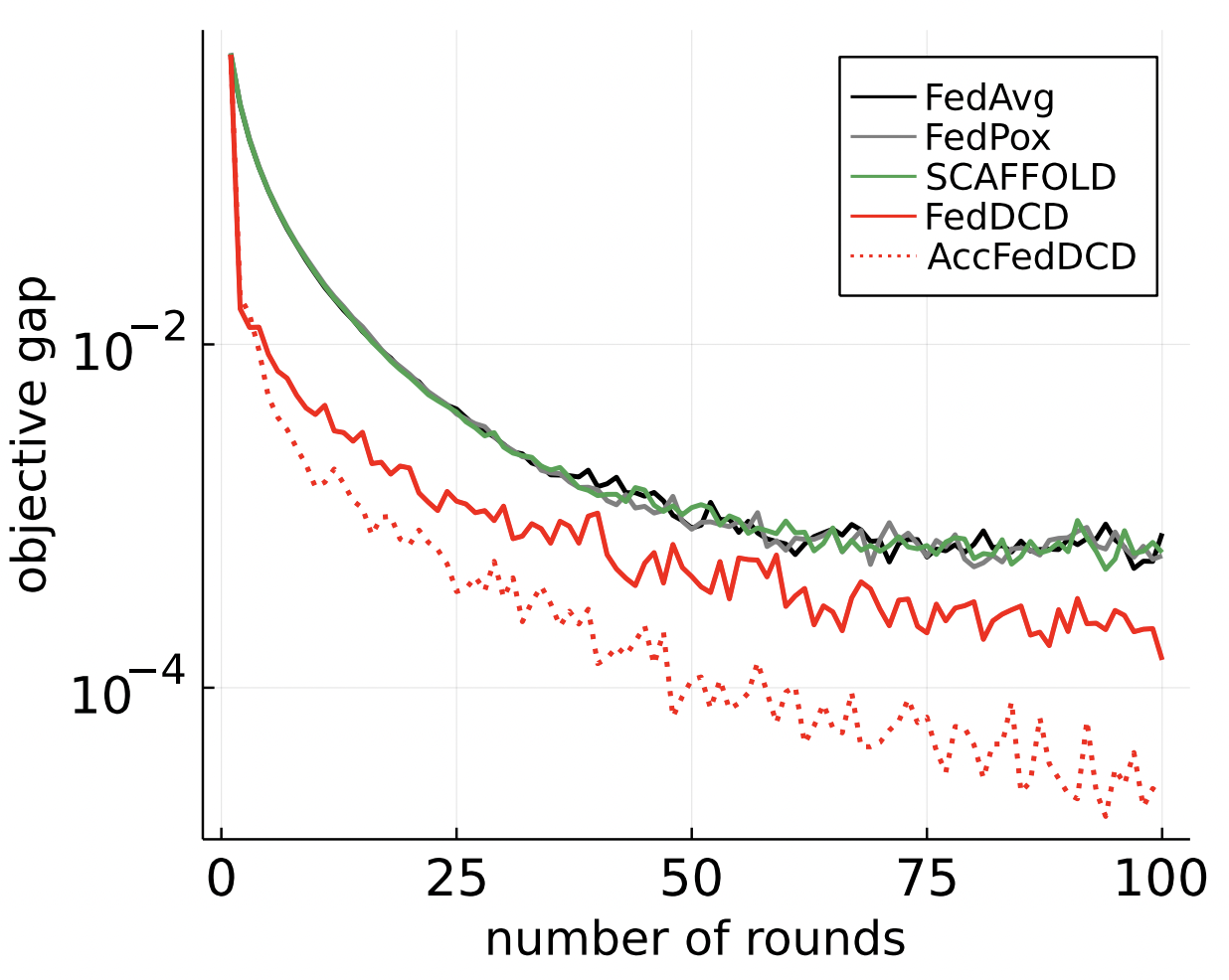
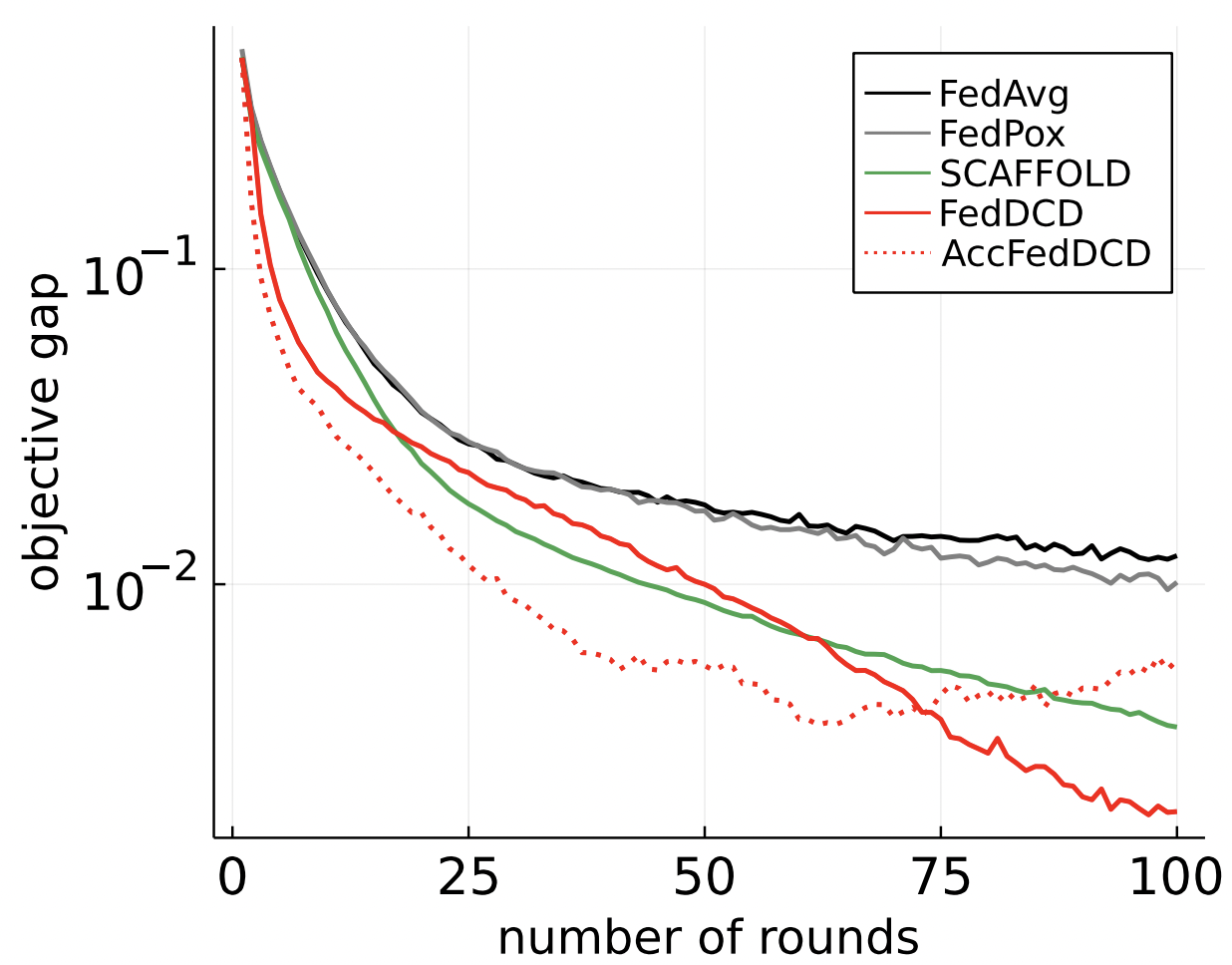
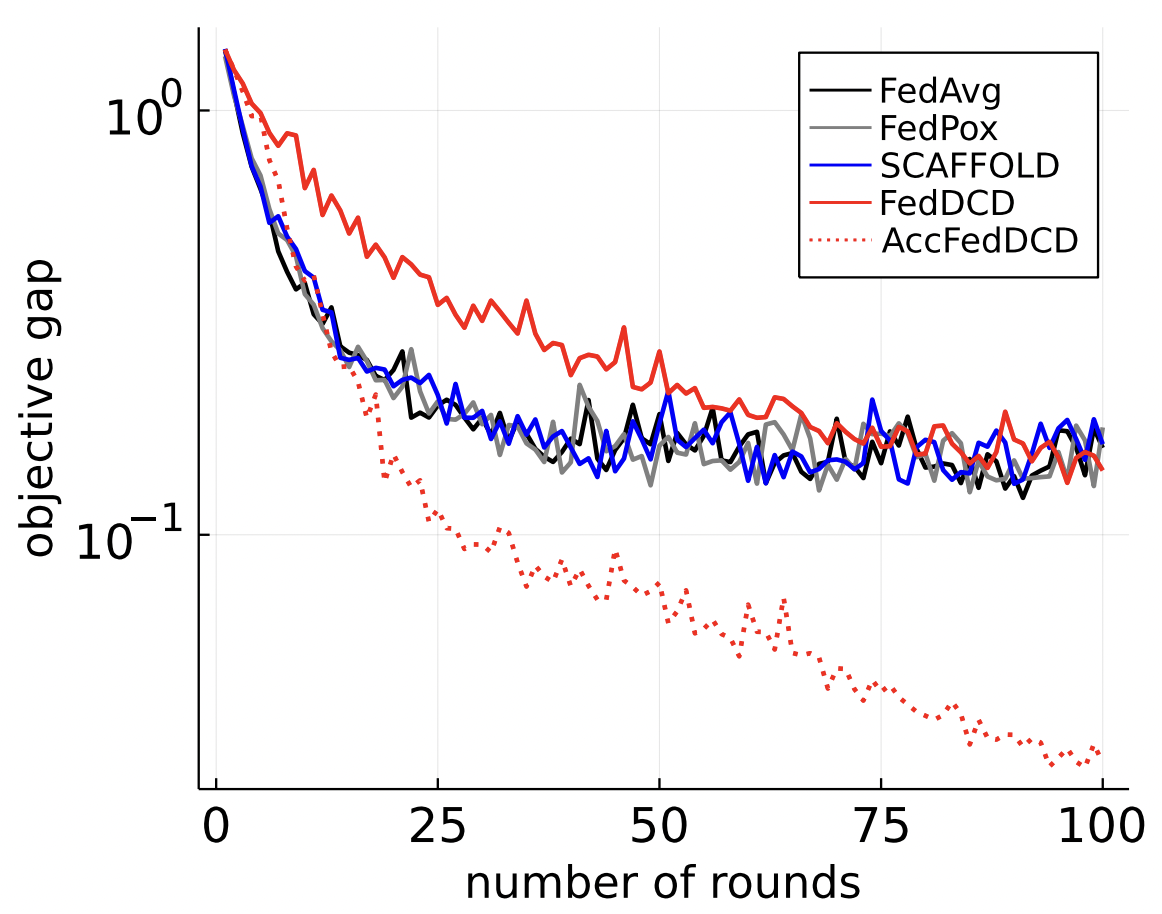
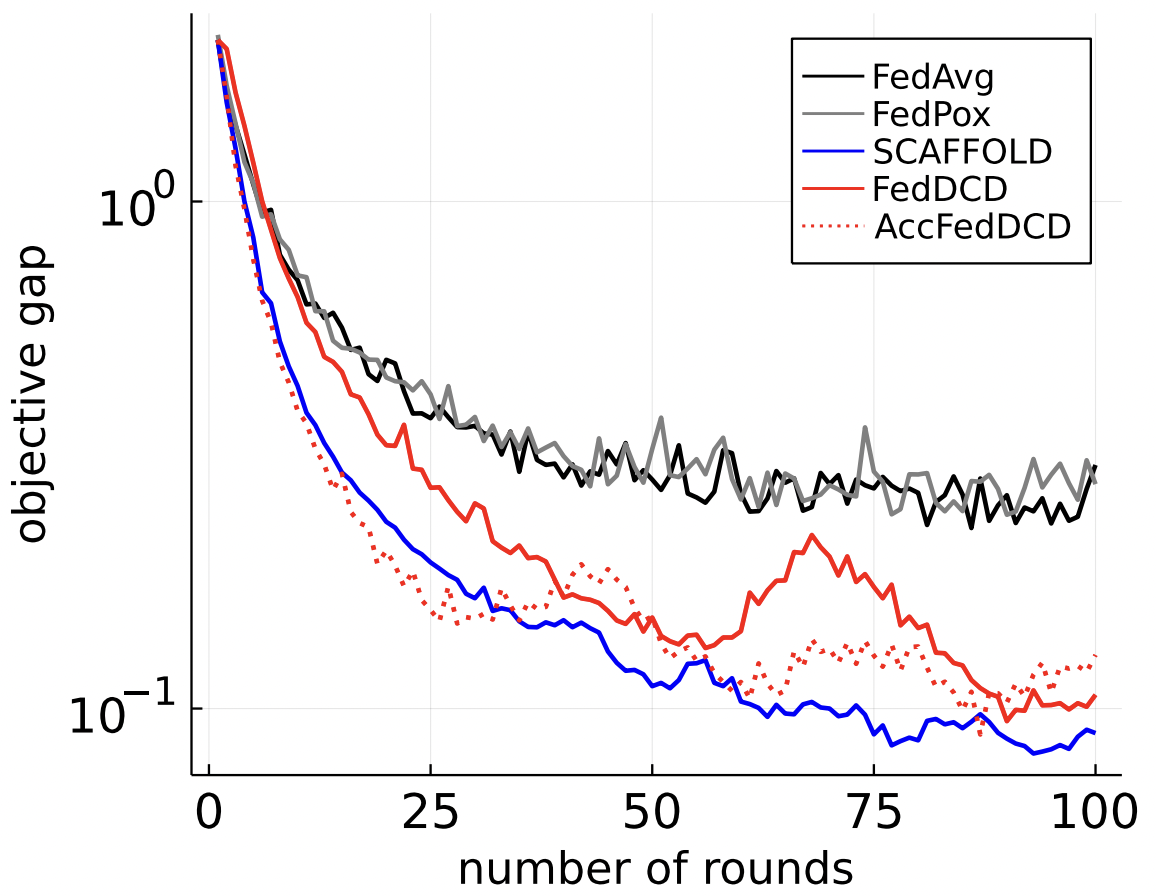
i.i.d
non-i.i.d
Federated Optimization
By Zhenan Fan
Federated Optimization
Slides for my PhD defence.
- 240



